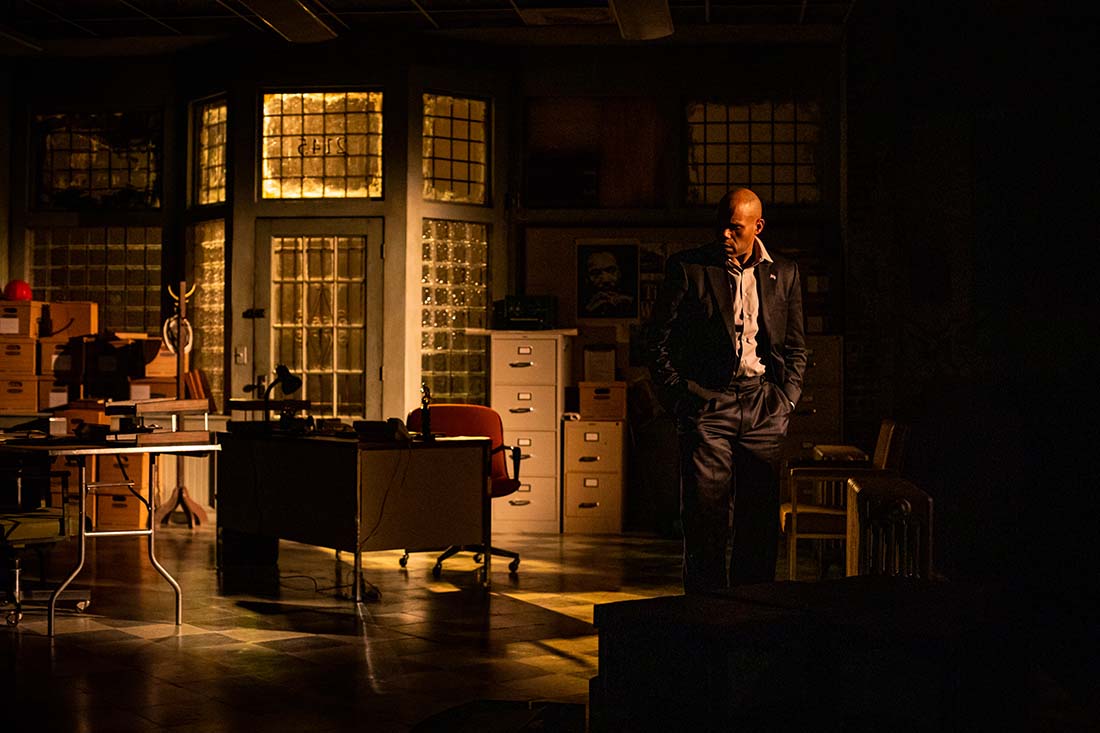
When Wilson writes he leaves some blood on the page. James Earl Jones
A crippling honesty and family ties mark August Wilson’s Radio Golf, a play that flows with humor along with sharply incisive dialogue and a clever story line. The tenth and final play of Wilson’s Century Cycle or Pittsburgh Cycle, each play tells a tale of the African-American experience in a decade of the 20th Century. First performed in 2005 by the Yale Repertory Theatre, Radio Golf went on to Broadway in 2007. August Wilson didn’t know that, as he died in 2005.
His masterful play is a dramatic depiction of the Black experience at the time, about the 1990 – 2000 decade in Pittsburgh’s Hill District. White business enterprises are hurrying to hire Black faces, eager to demonstrate their supposed devotion to diversity. The story revolves around a plan to revitalize the Hill District by putting up high-rise apartments and upmarket chain stores. The plan involves razing an old house with unpaid taxes owned by an elderly Black man, Elder Joseph Barlow. He lends a comic touch even as he puts his foot down.
Harmond Wilks, a real estate developer and mayoral candidate, shares an office with his friend and partner Roosevelt Hicks. Harmond Wilks’ wife, Mame, seems superfluous, as her character has little to contribute to the play except her beauty. Hicks, a rabid golfer, does a weekly radio program called Radio Golf. Sterling Johnson, who was a school classmate of Harmond’s, is a contractor and handyman who robbed a bank years ago because he didn’t have any money. Bernie Smith, a white wheeler dealer, wants to make Roosevelt a partner in the buyout of a local radio station, taking advantage of Hick’s Black face to get a better price. Harmon becomes aware that there were irregularities in the purchase of the house slated for demolition, and insists that it is wrong to destroy Elder Joseph’s house. His stand finds him aligned against many progressive forces. Honesty can prove fatal to the career of a politician, but he has to stand up for what he believes is right – or does he? On the one side are family, friends, ambition, and principles. On the other, progress and the greatest good for the greatest number. Hearts on one side, heads on the other. Is there a time to compromise with reality?
With the Arden stage ringed with seats on three sides, sometimes the actors face you and sometimes they don’t. When they are not facing you it’s not always easy to make out what’s being said. The use of an overhead mike to amplify the actors’ voices would help. Wilson’s dialogue is too good to miss. But even when straining to hear, the production is beautifully done – professional, inspired, and on the money. Director Kash Goins keeps up the tempo in Radio Golf and guides the action with a sure hand. This performance is the Arden Theatre at its best, and is not to be missed. It would be great to see the other nine plays of Wilson’s Century Cycle staged.
End note: August Wilson’s father was white and his mother was Black. His father left when he was five years old. August, deeply feeling the racism he faced as one of few Black students, dropped out of Catholic High School in Pittsburgh’s Hill District at age 15. He didn’t want his mother to know he wasn’t in school, so he hid in the Carnegie Library reading books. Interested in stories by or about Black people, he started writing plays in 1978.
“Blacks see the content of their lives being elevated into art. They don’t always know that it is possible, and it’s important for them to know that.” (August Wilson, 1999)
[Arden Theatre Co., 40 N 2nd Street] March 23-April 16, 2023; ardentheatre.org
Roosevelt Hicks…………Phillip Brown
Harmon Wilks…………….Kesserack Kemnew
Elder Joseph Barlow……Damien J. Wallace
Sterling Johnson…….…..Brian Anthony Wilson
Mame Wilks………..…….Zuhairah
Creative: Director: Kash Goins, Asst. Director: Reva Stover, Scenic Design: David P. Gordon, Costume Design: Levonne Lindsay, Lighting Design: Thom Weaver, Stage Manager: Jason Weixelman, Stage Manager Asst: Rodrick Edwards
